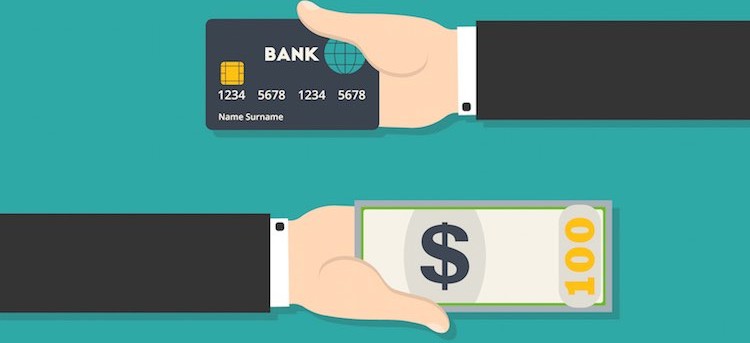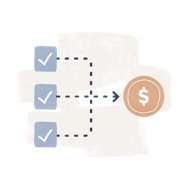It can be frustrating to run a business, decide you need some sort of financing, and discover that your credit scores don’t qualify you for many options.
There is, however, an option to consider: a secured business credit card. Here, we’ll introduce you to what one is, examine when you would want one, and help you determine which card is best for your needs.
A secured credit card can help you establish a positive payment history and show lenders you’re a responsible credit card user, so you can get better rates and terms to finance your business.
Check out the Nav marketplace to see your matches. Nav customers using MatchFactor are 4x more likely to get approved for a business credit card.*
*Nav customer data showed a 7% business credit card approval rate in December 2015 (without MatchFactor) versus a 29% approval rate in May 2016 (with MatchFactor).
What Is a Secured Business Credit Card?
Secured credit cards are designed for people with poor credit or very little credit history. A deposit protects the card issuer in case of default, and responsible use of the card can help the cardholder establish and build credit history. Business credit cards are designed for business expenses.
For many businesses, credit cards are an essential part of your business activities. They can help you build your credit scores and credit history, and they can help you obtain the assets you need to properly run your business. Unfortunately, bad or non-existent credit may make it difficult to be approved for a credit card. If you don’t qualify for a traditional business credit card, and if you are looking to establish or rebuild your credit, a secured business credit card can represent a viable option.
So, what exactly is a secured business credit card? Quite simply, it is one that requires a deposit or collateral up front. In most cases, the issuer will require you to link your bank account so the deposit can be deducted directly, but a few issuers will allow you to send those funds to them after approval.
Though putting down a deposit for a credit card may not sound ideal, a secured business credit card can be a valuable tool to build and repair your credit. The security deposit will ensure lenders that, despite your bad credit, you will be able to pay them back.
Much like a regular credit card, you can use a secured credit card to make purchases or pay bills when cash is not an option. Your payment history will be reported to the major credit bureaus and an account that remains in good standing (no late payments) over a period of time can help you boost your credit scores and build your credit history.
How a Secured Business Credit Card Works
For the most part, a secured business credit card works like any unsecured credit card, with the exception of that deposit. Most issuers will start you with a credit line equal to your deposit, but a few will increase your credit line above your deposit if you pay on time for a certain period of time.
Your card may come with an annual fee, so budget for that each year. Like any other credit card, you may be able to access balance transfers to pay off other cards or debt, and you may be able to get a cash advance at ATMs (note that these tend to have a higher APR or other fees associated with the privilege).
If you pay your monthly bill on time (preferably the total amount due rather than minimum), you can build credit over time, which may help you qualify for an unsecured credit card. Keep in mind, though, that a small credit line means it is easy to hurt your credit scores with high “utilization” or “debt usage.” In other words, if your balance reported to the credit reporting agencies is close to your credit limits, your credit scores may be negatively impacted. To be safe, try to keep your balances below 20% of your credit limit.
How Much Money Will I Need for a Security Deposit?
The amount for the security deposit required will vary from lender to lender. Most issuers require at least $500 but there are a few with lower requirements. For those who have bad credit, that may sound scary, but keep in mind that this particular type of card is specifically for individuals or businesses with bad credit.
Typically, your credit limit will be equal to or a percent more (or less) than the required cash deposit; this means that the credit card issuer is lowering its overall risk by securing funds ahead of time. For example, if you want a card with a $500 credit limit and are approved, you will typically be required to pay a security deposit of $500, or close to that amount.
It’s important to note that this is not a prepaid credit card in which your deposit will be used against the balance you accrue. Instead, your deposit will be held separately, and you will be required to pay your bill in full without relying on the money you paid up front.
What Happens to My Deposit for a Secured Business Credit Card?
As mentioned above, your deposit is held separately, and much like a deposit for say, rental equipment, you will get it back as long as you live up to your end of the bargain. In this case, that bargain is making regular payments on your account and eventually reaching a zero balance.
When exactly you get your deposit back can also vary from one credit card issuer to another, but in all circumstances, your account will need to be in good standing. With that in mind, these are the most common scenarios in which a secured credit card lender will return your deposit.
In one scenario, the deposit can be returned when you decide to close the account. Of course, it’s not as simple as just saying, “I’m done; let’s close this down.” Your account must be in good standing and carry a zero balance at the time of closing. Follow the protocol provided by your business credit card company for closing your account and receiving your deposit back.
The other, perhaps most desired, scenario is one in which you successfully reduce your perceived risk by maintaining a history of on-time payments and manageable balances. In this case, the lender may decide to convert your account from a secured credit card account to an unsecured card and to return your deposit without requiring you to close the account. This may not be automatic, so keep an eye on your credit score, and when it rises and you have a history of paying on time, ask your lender if you can convert your card to an unsecured business credit card. The lender will probably run your personal and/or business credit with one or more of the major credit bureaus, and make a decision based on those.
What Risks Are Associated with Secured Business Credit Cards?
Though the application and approval process may be slightly different, when it comes to fees, APRs, and credit reporting, a secured credit card operates much like a regular credit card.
Secured credit cards often have an annual fee associated with them, and though rates vary drastically from lender to lender, the APR can be quite high. Although the introductory APR may be low (or even zero), keep an eye out for that skyrocketing after the initial period. Missing a payment or not paying in full can quickly land you in a dangerous and expensive place.
Likewise, if you only pay the minimum payment, accumulated interest can make it difficult to pay your monthly bill; if you can’t pay your monthly bill on time, you’ll be facing late fees that will add on to your total balance. If you are unable to pay your debts, you may default and find your account in collections. Of course, this will further damage your credit score, since your late payments will be reported to all credit bureaus.
For that reason, it’s important that you are honest about your ability to repay your debts. If you are really strapped, it would be wise to keep the total balance low and to pay it in full at the end of every billing cycle. Keep an eye on your credit limit and how close you are to hitting it, and adjust business spending accordingly.
Alternatives to Secured Business Credit Cards
If your credit is decent and you don’t have to have a secured business credit card, you have other business financing options.
Business Credit Cards for Fair Credit
If your credit is decent—not great—there are unsecured business credit cards you may qualify for. Typically you need a FICO credit score between 580 and 669 to qualify for these. These business credit cards for fair credit are specifically tailored to business owners who are working on building or rebuilding their personal credit histories. You may start out with a lower credit limit that you can increase as you prove a history of paying your bill on time.
Vendor Accounts
Another way to get access to the products you need and build your credit is through vendor or supplier credit (a.k.a. “tradelines”). Many vendors (think: those selling office supplies) offer you credit directly through them. You may have a business charge card (one you can only use with that company) or simply a tradeline account that allows you to make purchases and pay off your balance later. Here are some easy approval tradeline accounts that don’t check business credit.
Business Credit Cards for Startups
If you’ve recently launched your startup, you probably don’t have credit scores or history. Still, there are business credit cards for startups you likely qualify for. You may even be able to get employee cards if you have staff that need to make purchases for your startup.
Business Rewards Credit Cards
Many business owners like the perks that come with business rewards credit cards. Each purchase will help you earn rewards or statement credit that will help you reduce overall business expenses. Keep in mind these small business credit cards may have an annual fee.
Personal Credit Cards for Business
Though it’s not always recommended to use a personal credit card for business (it can make managing your business expenses more challenging), in a pinch, it may be an easier solution since you likely already have a personal card. Just remember: charges on your personal credit card won’t be reported to business credit bureaus, nor will they help you build your business credit history.
Check out Nav’s business credit card marketplace to find the right business credit card for you!
Business Loan
If you want another option other than a credit card, consider taking out a business loan. This can be a good option if you need a large sum of money all at once, or cash for a purchase that doesn’t allow credit cards.
Choosing the Best Secured Credit Card for Your Business
There are few secured business credit cards available so your choices will be more limited than if you were searching for an unsecured business credit card. Still, the best place to start in determining what type of business financing is best for you is to access your free personal and business credit scores to see what you qualify for. Using Nav, you can not only view each credit score for both personal and business, but you can also see which credit cards or loans you may be eligible for.
Deciding on the best secured business credit card will depend on what you’re looking for. Do you want a card with no annual fee, or are you willing to pay a fee for a card with a rewards program you can use to earn great cash back rewards? Is having a cash advance option important to you?
Pay attention, too, to the interest rate. Realize that the APR on purchases will likely be lower than for cash advance or balance transfer offers. Factor this into your budget, as paying your balance due over time will cost you more.
Secured Business Credit Cards Help You Rebuild Credit
It’s no crime to have scant or nonexistent credit history or low credit scores. The key is what you do to rebuild them. Secured business credit cards are a great tool to do just that and to show both lenders and the major credit bureaus that you’re a reliable customer.
Yes, having a secured card requires you to have cash on hand for that deposit, but once you establish a positive payment history, you should be able to qualify for an unsecured credit card. Keep an eye on your personal and business credit reports to ensure that your payments are reflected there.
This article was originally written on January 6, 2020.



Have at it! We'd love to hear from you and encourage a lively discussion among our users. Please help us keep our site clean and protect yourself. Refrain from posting overtly promotional content, and avoid disclosing personal information such as bank account or phone numbers.
Reviews Disclosure: The responses below are not provided or commissioned by the credit card, financing and service companies that appear on this site. Responses have not been reviewed, approved or otherwise endorsed by the credit card, financing and service companies and it is not their responsibility to ensure all posts and/or questions are answered.